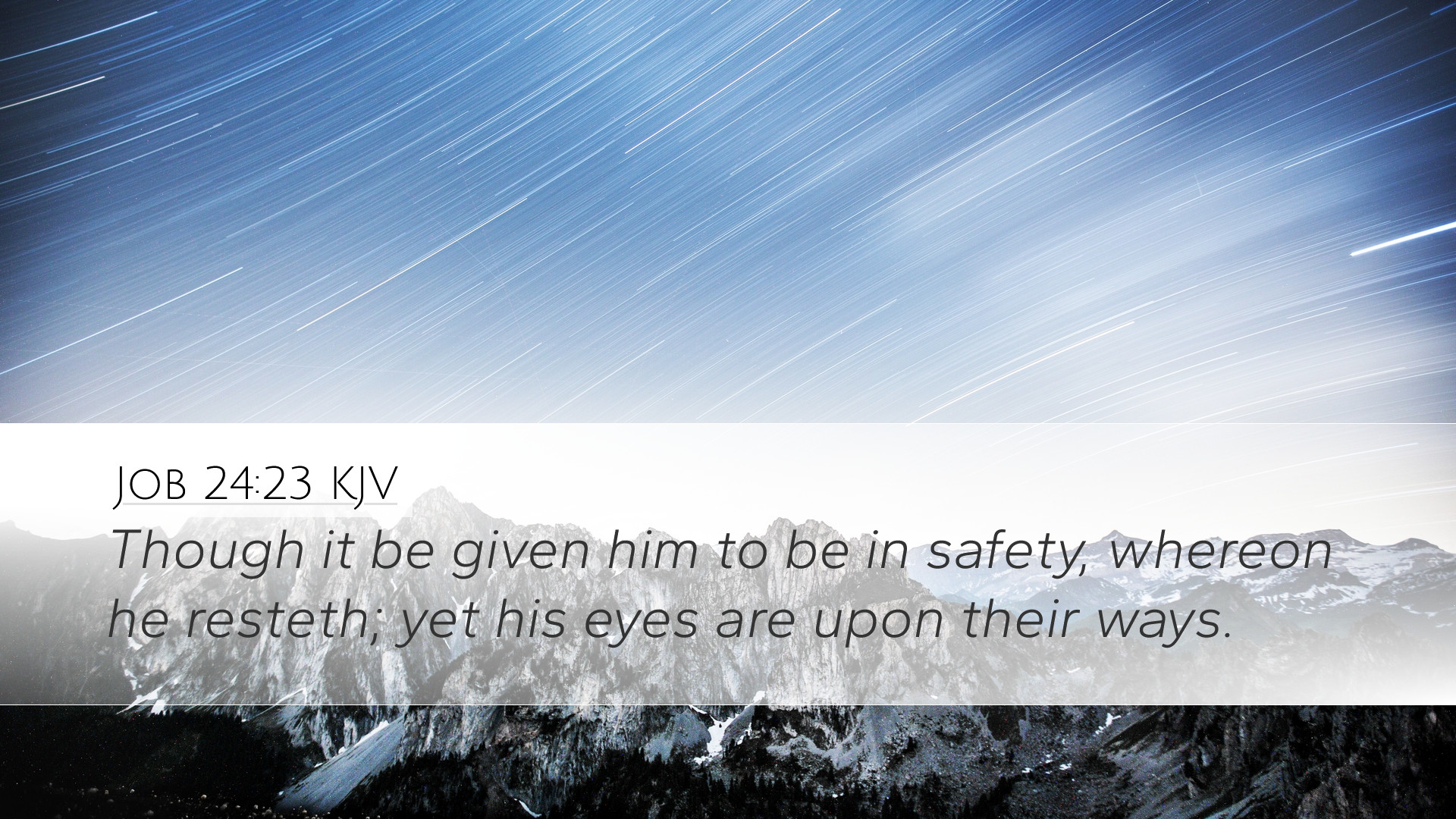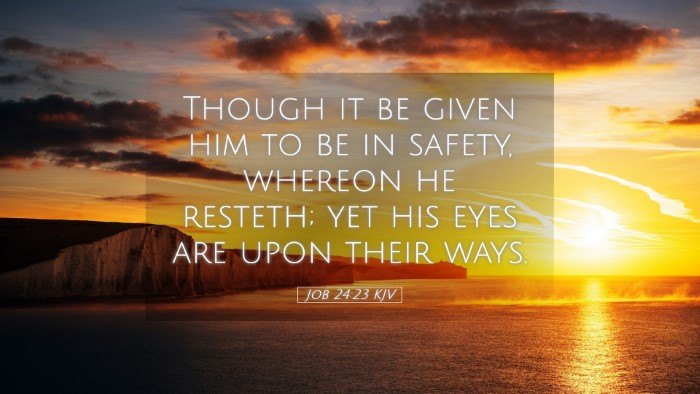Old Testament
Genesis Exodus Leviticus Numbers Deuteronomy Joshua Judges Ruth 1 Samuel 2 Samuel 1 Kings 2 Kings 1 Chronicles 2 Chronicles Ezra Nehemiah Esther Job Psalms Proverbs Ecclesiastes Song of Solomon Isaiah Jeremiah Lamentations Ezekiel Daniel Hosea Joel Amos Obadiah Jonah Micah Nahum Habakkuk Zephaniah Haggai Zechariah MalachiJob 24:23
Job 24:23 KJV
Though it be given him to be in safety, whereon he resteth; yet his eyes are upon their ways.
Job 24:23 Bible Commentary
Commentary on Job 24:23
Verse Reference: Job 24:23 - "He gives them security, and they are supported; His eyes are upon their ways."
Contextual Analysis
The Book of Job deals extensively with the problem of suffering and divine justice. Chapter 24 is a pivotal section where Job articulates his frustrations with the apparent prosperity of the wicked amidst their injustices. This highlights a profound theological tension concerning the nature of divine oversight and human suffering.
Matthew Henry’s Insights
Matthew Henry emphasizes that God provides a certain security to the wicked during their lifetime, allowing them to flourish momentarily in their malevolence. However, this prosperity does not equate to divine favor. Henry suggests that God's providence does not always operate in ways that are immediately visible to human understanding. He notes that the phrase "He gives them security" reflects the common grace that God affords to all humankind, enabling even the unrighteous to partake in worldly resources.
- Divine Surveillance: Henry elaborates on "His eyes are upon their ways," indicating that while God may allow the wicked to prosper, He is nevertheless watchful of their actions. There is an implicit warning that accountability awaits beyond this life.
- Temporary Security: He further cautions readers against interpreting this temporary security as an endorsement of their ways, as true security lies in righteousness manifested in a life aligned with God’s will.
Albert Barnes’ Commentary
Albert Barnes provides a more intricate exploration of the meaning behind Job 24:23. He interprets the "security" mentioned in the verse as a reference to the moral indifference or apathy that can characterize the lives of the wicked. Barnes argues that such individuals may enjoy a façade of comfort, suggesting that this security is but a temporal respite from the consequences of their sins.
- Observation of Injustice: Barnes presents the paradox of God’s awareness of the unjust ways of these individuals. He notes that while the wicked delight in their misdeeds, the Lord’s omniscience ensures that their actions are recorded, thus igniting the importance of divine judgment.
- Philosophical Implications: The commentary also delves into the philosophical implications of divine justice, asserting that the prosperity of the wicked should not lead individuals to cynicism regarding God’s justice. Instead, it should inspire trust in His ultimate judgment.
Adam Clarke’s Considerations
Adam Clarke’s exposition sheds light on the contrasting perspectives within the text of Job. He emphasizes the distinction between God's patience and His eventual justice. Clarke argues that even those who appear to be secure in their wickedness are living on borrowed time and are attempting to evade the inevitable consequences of their actions.
- The Role of Divine Patience: Clarke notes that "He gives them security" signifies God's long-suffering nature; He allows time for repentance, viewing this as a profound act of mercy.
- Judgment and Accountability: Clarke ultimately reiterates the message that while sinners might experience temporal peace, they do not escape the divine gaze. His interpretation serves as a reminder that God's justice will prevail, as the eyes of the Lord are ever watchful.
Theological Implications
This verse poses significant theological questions regarding divine justice and human agency. It encourages deep reflection among theologians and scholars about the character of God, the understanding of grace, and the moral universe. The idea that the wicked can experience security challenges the typical views of retributive justice and invites profound contemplation about the nature of divine providence.
- Understanding Prosperity: The commentary collectively suggests that God's apparent inaction does not indicate approval of wickedness. Instead, it invites believers to recognize various dimensions of God's plan that transcend human comprehension.
- The Nature of True Security: Scholars and pastors should explore what constitutes true security—grounded in faithfulness and righteousness versus the superficial peace experienced by those in rebellion against God.
Conclusion
Job 24:23 serves as a compelling reminder of the complexities of divine justice and the realities of human existence. The insights from the public domain commentaries of Matthew Henry, Albert Barnes, and Adam Clarke converge on the themes of God’s omniscience, the temporary nature of wickedness, and the ultimate assurance of divine judgment. As spiritual leaders, pastors and theologians are called to convey these truths, encouraging believers to find comfort in the knowledge that God's justice will ultimately prevail, and inviting reflection on the decisions they make in light of eternal consequences.


